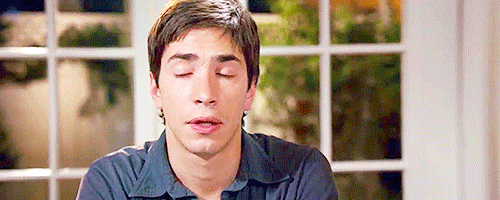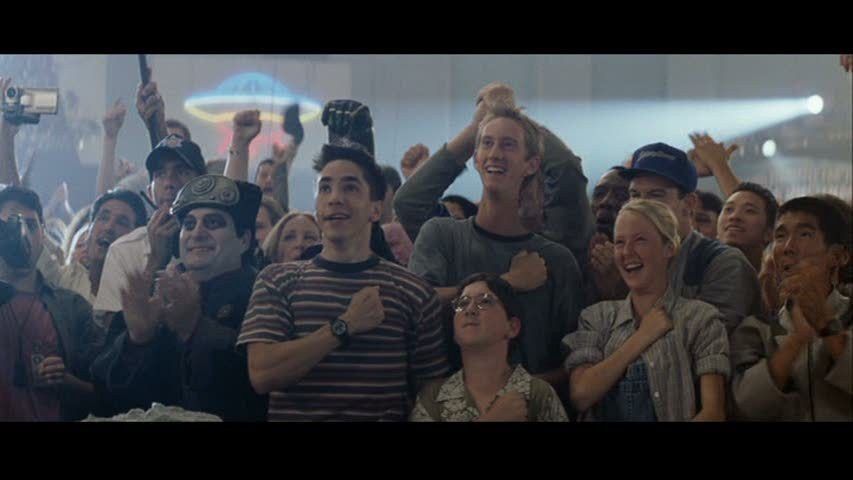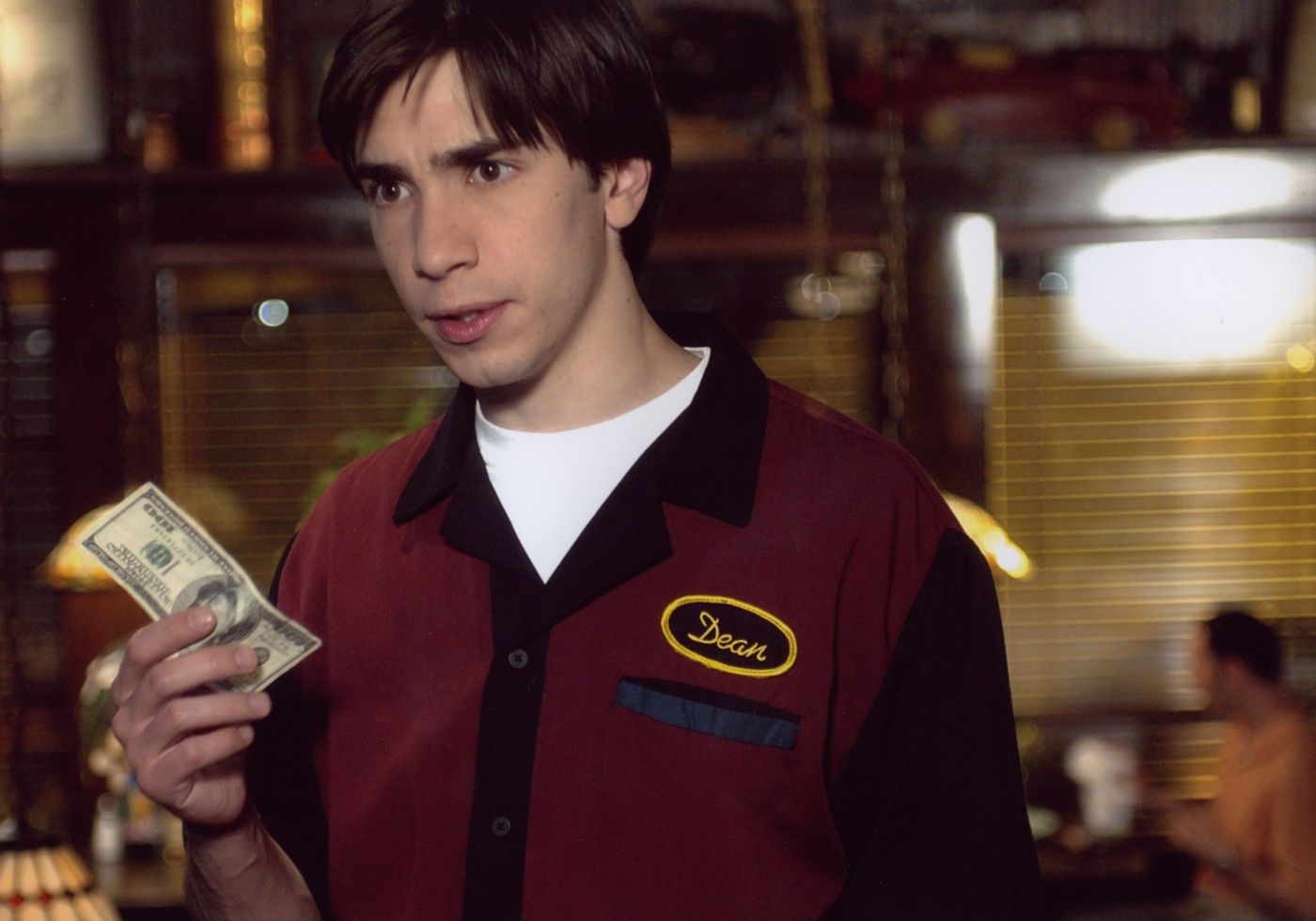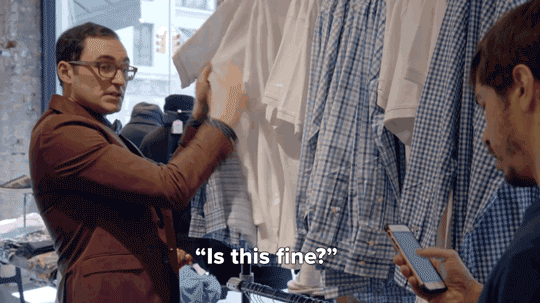The Greatest Millennial Actor in the Universe is Justin Long

One of the great parts about being a millennial is that everyone else likes to tell you what you are and aren’t like and what does and doesn’t represent you. It’s the best.
It’s American tradition to anoint pop culture figures as being totally representative of a generation. Typically (though not always) this person is an actor. Gen X? Here’s Kurt Cobain. Greatest Generation? Have yourself some James Dean. Digital Natives? Here’s some YouTube star I’ve never heard of.
But while every one else seems to delight in telling we millennials what makes us tick, we’ve yet to agree on the answer to a very pressing question: Who is the actor that best represents the millennial? Shia Lebouf? Ryan Gosling? Allow me to make the case that the actor that best represents the millennial generation is Justin Jacob Long.

You may know him as the awkward guy from Dodgeball or the hacker dude from Die Hard (more on that below). But Justin Long’s entire career is like a roadmap for the typical millennial. His role selection, especially in the aughts, might as well be a Gen Y biography, and his characters often seem eerily prescient in regards to the events of the early millennium. It’s as if Justin Long is a millennial precog, able to see what’s coming for my generation before it arrives. Don’t believe me? Let’s take his five most appropriate projects, one at a time.
1. Galaxy Quest (1999)

The Premise: In Galaxy Quest, the cast of a Trek-like fictional show are beamed aboard an actual alien vessel. The aliens believe the show is real and now the cast must save the the galaxy. It’s a charming satire of super-fan culture, and that’s where our boy Justin comes in. He plays Brandon, a superfan of the show who finds himself actually helping the crew as they actually save the universe.
Galaxy Quest is one of those annoying movies where most who watch it enjoy it immensely, but nearly no one has seen it. Thus you have a small pocket of people who claim that Galaxy Quest “is actually the best Star Trek movie” and aren’t trying to be contrarian, they actually mean. I may be one of those people.
Millennial bona fides: In the years since GQ’s release, pop culture has undeniably been turned over to the “nerds.” Hollywood, books, video games, and TV shows are tuned into pleasing the superfan, those who are passionate fans of complicated fictional universes.
Simultaneously, pop culture is fracturing into tiny pockets of superfans. Millennials, more than any other generation, were raised (an encouraged by our nerd parents, when applicable) to enjoy unlimited access to their nerd flavor of choice. Coming of age alongside the internet made it easy to “find your people.” Thus it is easy spend your free time debating, creating, and most importantly, identifying yourself using these nerd universes as a backdrop.
In Galaxy Quest, Brandon is millennial superfan incarnate. Had he been born 15 years earlier, he’d be an outlier. An obsessive geek. But for the first time in his character’s life, his obsessive knowledge about the Galaxy Quest show is rewarded rather than punished. And so go the millennials — Being “such a nerd” about Harry Potter, comic books, or Star Wars gives us a tribe to run with and a pop culture touchstone. The nerds have long since won, but Brandon was their first conquerer.
2. Waiting (2005)

The premise: If I were someone who cared deeply about the art of cinema I might say that Waiting is a gross-out comedy that happened to catch a bunch of eventually-super-successful people at the exact right moment (Looking right at you then suddenly not at you, Dane Cook). But I’m someone who usually won’t watch a movie unless it’s on cable and I can’t reach the remote. So here we are.
Waiting is centered around the staff of TGI Fridays-like restaurant and the low-level anxiety and unique brand of existential crises each one faces. There are also crude sex jokes. Long plays Dean, the main character who began working at the restaurant as a stop-gap of sorts and now must decide if he should take a promotion to make his hold-over job his career.
Millennial bona fides : Stop me if this sounds familiar: Underachieving but well-educated young person is forced to work a job he is overqualified for because of a lack of other opportunities and/or he can’t quite figure out his next steps. We’re millennials, how can we commit to anything? There are so many possibilities! We’re the generation that was told we are all “special.” Which set our expectations really high. Which means we’re set up for disappointment.

Waiting was released in 2005, just as all those who would graduate during the financial crises entered college, and most of us landed right where Dean is. Which makes this movie a millennial cautionary tale that was just ahead of its time enough to make for oddly bracing viewing well after its release, though not so bracing that it was obvious in the moment. There are also jokes that prominently feature prosthetic scrotums.
The movie advocates boldness and drastic action to shake up any left over malaise from misguided career expectations. Waiting is not a gross-out comedy, it’s millennial medicine, delivered via genitalia jokes and Andy Milonakis in cornrows.
Bonus: Long pretty much plays the same character in New Girl. A show that is pretty much a cleaner, more hipster-friendly take on the “non-traditional ‘family’ all surviving together” theme as Waiting.
3. Accepted (2006)

The Premise : Bartleby Gaines is happy-go-lucky student that is rejected by every college he applies to. So he does what any good protagonist does: He teams up with Jonah Hill and gets scrappy using unconventional methods (see: Moneyball, Superbad, Knocked Up, et al).
Millennial bona fides:
The plot turns on the Long’s speech to bureaucrats (above) who want to shut down his made up school. The school allows students make the curriculum (who’s to tell US what we should learn!), where there are no scary grades (never face rejection again!), and where, no kidding, a Daily Show correspondent is the dean. It’s a millennial’s paradise.
Millennials are the generation whose representatives are calling bad cafeteria food cultural appropriation. We’re creating “safe spaces” and demanding trigger warnings. In short, we’re remaking higher education to better conform to us, rather than the other way around. (You’re welcome, universe!) Many an old head has written a terrible hot take on how these damn young people can’t even take direction or rejection with out freaking out. Well, Accepted is that dream (or nightmare if you are, say, a baby boomer with a newspaper column) taken to its extreme, a school for snowflakes by snowflakes. All made possible by Bartleby.
4. The Mac Guy (2006)

The Premise : A series of Apple commercials depicting John Hodgman as the stodgy ol’ “PC” and Long as the trendy, reasonable “Mac.”
Millennial bona fides: Long’s Mac character was surely created in a Cupertino marketing laboratory, a magical elixir of focus groups and Steve Jobs’ imaginary trip to early aughts Brooklyn. Long’s “Mac” is casual, but not sloppy. Smart, but not pretentious. On to the latest trends but not in a way in which he, like, cares too much, man. He’s the way most millennials see themselves. Though sometimes Mac can ever-so-slightly teeter into obnoxiousness, which is the way most others see millennials.
The “I’m a Mac” commercials were Apple’s last great ad campaign (Adweek called it the greatest campaign of the decade), all from a company that is inexorably tied to the preferences and habits of millennials and in a survey was ranked our #2 favorite brand.
Long and the roles he had chosen before the campaign are so millennial that the greatest advertising and capitalistic enterprise in American history chose him to represent the generation. If that’s not a ringing endorsement, I don’t know what is.
5. Live Free or Die Hard (2007)

The Premise: Bruce Willis, now officially “too old for this shit” John McClane, is assigned to pick up Long, playing a computer hacker named Matt, for police business. Soon, a evil computer genius super villain (Timothy Olyphant) begins hacking power grids, bank infrastructure, military databases in an effort to overthrow the United States government. Bruce Willis doesn’t know much about this computer business, but he does take out a helicopter with a car. Meanwhile, Long becomes his nerdy, panicky sidekick.
(Long’s character lives in Camden, 30 minutes from where real-life Bruce grew up: Penns Grove, NJ. As a proud grad of PGHS, it’s good to see South Jersey get some screen time. But I digress)
Millennial bona fides: Years before North Korea (and James Franco) vaulted encryption and cyber-warfare into the public consciences, LFODH depicted our worse case scenario: a complete take over and erasure of all US digital infrastructure. It’s like Fight Club, with out the oddly identifiable psychosis. Since then, tech companies and digital thinkers have long lamented the U.S. government’s myopic views on encryption. There’s proven to be a generation gap when it comes to how Americans believe we should handle the very real digital threats out there.
Willis is the old-school dude, who thinks technology works just like the physical world—it can be overcome with determination and brute force. But, much like ascending millennials are moving to update our country’s views on technology, hacker Matt teaches John McClane that cyber-warfare is a different animal. In reality, a clever mix of both is what saves the day, which might not be so far off from the best real-life strategy.
Since LFODH, Long’s millennial bona fides have tapered off, just in time for Gen Y to age in as the dominate working population, no longer in need of his guidance and foresight. Thus, Long is now the pop culture icon we deserve, but not the one we need right now. Anymore.
